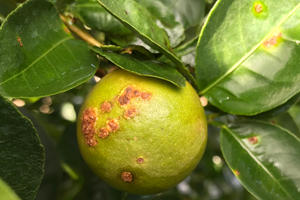An important bacterial disease that affects citrus trees and causes lesions, citrus canker has been effectively controlled by spraying copper. However, standard management techniques involve spraying excessive amounts of copper and water without consideration for the size of the trees.

“This technique resulted in a waste of resources as well as higher costs, detrimental environmental impact and risk for development of copper-resistant strains,” explained plant pathologist Franklin Behlau, who recently published an article discussing a more sustainable approach to managing citrus canker.
Behlau, a researcher at Fundecitrus, and his colleagues showed that it is possible to control citrus canker by spraying much less water and copper. “By adjusting both copper and water usage based on the volume of the citrus trees without affecting the quality of disease control, we have taken an important step to a more economically and environmentally sustainable citrus industry.”
This research was conducted in a field trial carried out during two seasons in a commercial orchard of Pera sweet orange in Brazil. The research identified the minimum copper deposition on the treated surface per spray necessary to protect against the disease.
“By using the most efficient treatments identified in our study, growers can save up 80% in the amount of copper and up to 60% in the volume of water used annually to manage citrus canker,” explained Behlau. “By using less active ingredient, growers can prevent accumulation of copper in the soil and reduce the long-term effects that it may have on the development of the root system and the tree canopy.”
For more information, read “Spray Volume and Rate Based on the Tree Row Volume for a Sustainable Use of Copper in the Control of Citrus Canker” in the January 2021 issue of Plant Disease.
This article was posted in the Citrus Industry E-Newsletter by AgNet Media.
Magna-Bon CS 2005 greatly reduces the amount of metallic copper used compared to conventional coppers. Conventional coppers can use upwards of several pounds of metallic copper per acre, while CS 2005 will use less than an 1/4 pound! Build-up of copper in the soil will affect yields in the fruit! Be environmentally friendly by using CS 2005.
With over 10 years of research by Dr. Jim Graham and countless trials in various countries such as Brazil where this particular article is written about, its “coincidental” that CS 2005 achieved the sames success!
For more information on application rates, please visit: https://www.magnabon.com/crop/orange/

